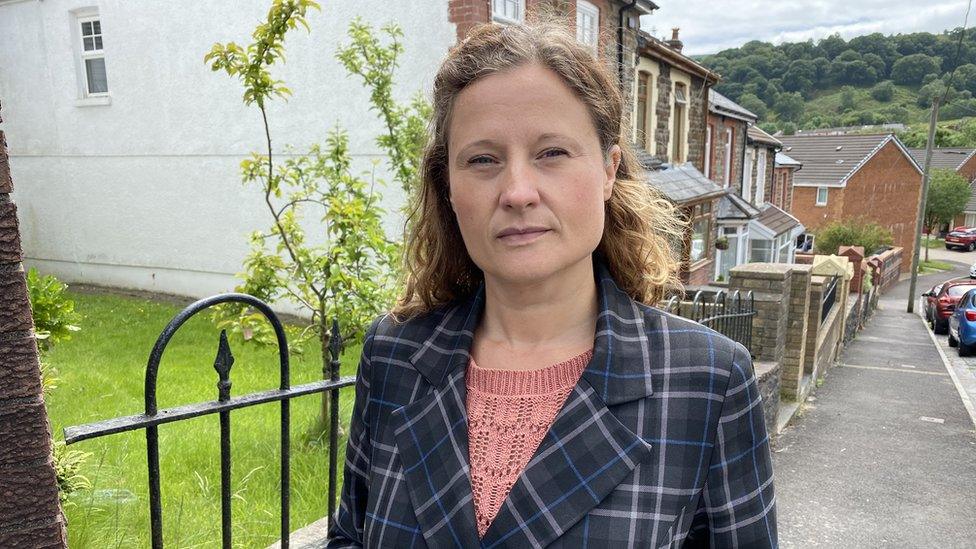Cost of living: Landlords fear 'massive housing crisis'
- Published

Tenants could face less choice and higher prices if new rules drive landlords out of the market
Landlords said they fear many will sell up and stop renting homes due to Wales' new housing rules.
Longer "no fault" eviction periods are part of a number of changes, set to be introduced in December.
The Welsh government said it would do all it could to ensure landlords had time to prepare.
But tenants have said having six months, instead of two, to find a new home if they were evicted would ease the pressure on them.
Landlords have said "uncertainty" around the new rules could make some sell on and create a "housing crisis" for tenants.
It comes as Shelter Cymru said it was seeing twice the number of tenants being subjected to these evictions.
Tim Holmes from Aberystwyth, Ceredigion, said he was in a "state of shock" when he received a no fault eviction notice.
"I felt I was in a fairly good place up until I received the notice [and] when I did, things started to unravel a bit," he said.

Tim Holmes said "things started to unravel" when he was given a "no fault" notice with two months' warning
Mr Holmes said facing eviction with just two months notice under the current rules meant tenants could "never quite feel secure".
"I think it's profoundly debilitating psychologically," he said. His case has yet to be concluded.
Meanwhile, Claire Green, from Miskin, Rhondda Cynon Taf, said she could no longer take the "risk" of being a landlord.
The single mum said she had already sold several of her properties.
She blamed the Renting Homes (Wales) Act for placing too much risk on landlords.
"There are a number of clauses coming in which could potentially send some people with a smaller portfolio like myself bankrupt," she said.
"A couple of properties, I was making very little profit on," she added. "I didn't feel confident enough to be continuing to self-manage and I just thought I can't do this anymore."

Landlord Claire Green says new housing rules have forced her to sell homes
Claire said many smaller landlords are worried about changing the notice period a landlord must give for a no-fault eviction, from two months to six.
"It's not a nice thing to have to give your tenant notice, however, there are situations that landlords find themselves in, be it through a divorce or financial difficulty and other situations, where they do need to give notice," she said.
She added that landlords are having to adapt to complete changes in how contracts work.
"When I found out that I was also going to have to replace that straightforward tenancy agreement with a lengthy contract, it was a no-brainer for me because I just haven't got the time.
"I work full-time, I'm a single mother and I haven't got the time to be doing this kind of additional work."
She said even though she had not needed to issue no-fault eviction notices to any tenants, she might have to consider it in the future in order to offload properties.
Chris Coates, who runs a Facebook group for more than 600 landlords in Wales, said he was seeing discussions about selling up and quitting on an "almost daily basis".

Chris Coates says many landlords are anxious about the new rules
"In my experience the vast majority of landlords are good, decent people that want to do the right thing," he said. "There's a lot of uncertainty right now and a lot of anxiety among landlords.
"My fear is that there are going to be a lot of landlords who decide to sell and there's going to be a reduction in the amount of rental stock.
"Landlords could also be so anxious about who they let their property to that it will affect the ability of our most vulnerable tenants to find somewhere to live."


What are the rule changes for renting in Wales?
Two types of contracts, one for community landlords and their tenants and one for private landlords and their tenants
Landlords must ensure all properties are fit for human habitation, including natural lighting, working smoke and carbon monoxide detectors, and anti-damp standards
The minimum period for no-fault evictions is being extended from two to six months for new tenants from December
If a tenant breaches their contract the minimum notice period is one month or shorter in cases of anti-social behaviour or serious rent arrears

The Welsh government had planned to introduce the new housing law in July, but that has now been postponed until December, in part to allow more time for landlords to prepare.
Changes apply to social landlords as much as the private sector, and the head of an umbrella body for housing providers said the Welsh government was told it was "impossible" for them to implement the new law by the original date.
Documentation 'drip fed'
Katie Dalton, Director of Cymorth Cymru, said the sector had been promised that documentation and regulations would be available six months before the implementation of the Renting Homes Act.
She told Walescast, the BBC Wales politics podcast, that this had instead been "drip fed over the last few months" - with some published this month.
"At the implementation date that was planned, mid-July, that's really too late for social landlords to be training all of their staff, teams, setting up new IT systems, and making sure all of those new contracts are in place."
"That's why social landlords, local authorities wrote to the Welsh government and said we're in an impossible situation - we're really finding it impossible to implement on this timescale."
She said social landlords had been dealing with a "huge amount of pressure" over the last couple of years, with nearly 8,000 people in temporary accommodation seeking homes, and 1,000 people to housing authorities as homeless every month.
At the moment roughly 500 people a month can be moved into permanent accommodation. With Ukrainian refugees as well, there are around 10,000 people trying to find a permanent home.
Shelter Cymru said the delay had been a "great surprise" with no-fault evictions doubling over the past 12 months.
"We felt it was a real blow for tenants," said Jennie Bibbings, the charity's head of campaigns.

Jennie Bibbings said delays in introducing the new laws surprised Shelter Cymru
"There are such great benefits in this legislation and we have all been waiting for such a long time for it.
"In our casework, no-fault evictions have doubled over the last 12 months," she said. "From what I hear a lot of them are linked to house sales."
She explained the "toxic" combination of a UK house price bubble and major rules may be "extra impetus to some landlords who are already thinking of getting out of the game."
What do tenants think?
Carl Sully, 28, said it would have made a "massive difference" to his young family if they had six months, rather than two, to find a new home after being issued with an eviction notice by their landlord in Newport.
"Me and my partner both work full-time including overtime and putting in extra hours," he said. "We have struggled to find anything in our price range, as well as the bond and deposit, on such short notice.
"It has had a massive strain on our mental health, family and money worries as we have two young sons to provide for. It was scary."

Carl Sully and partner Sian Davies said having six months rather than two to find a new home would have made a "massive" difference
Carl said his family eventually needed help from social housing teams and were "lucky" to find somewhere in time.
Research from the Bevan Foundation, external recently suggested that a rising number of people in Wales were at risk of homelessness because of a shortage of affordable properties.
Data collected from 1,775 rental adverts across Wales indicated only 24, or just 1.4%, were at a price fully covered by the housing allowance.
There were previously thought to be 130,000 landlords but Rent Smart Wales, launched by the Welsh government in 2015 to tackle bad landlords, said the real figure is thought to be only 90,000.
Jeanne Fry-Thomas, a director at Bidmead Cook estate agents in Blaenau Gwent, said many landlords were "withdrawing from the private rental market".
"Many of these landlords rent to people on housing benefit," she said.
"The private rental sector is so bad the number of properties available is dropping all the time. That's why we are seeing rents go up so much, it's down to supply and demand."
A Welsh government spokesperson said: "This type of large reform happens very rarely and we want to do all we can to ensure landlords have enough time to make the necessary preparations and get things right for tenants."
The spokesperson said alongside the Renting Homes Act the Welsh government has launched a scheme offering incentives to owners who do not want to actively manage their property so they can lease it to their local authority instead.
For more on this story, watch Wales Live, BBC One Wales at 22:35 BST on 15 June and afterwards on BBC iPlayer.

FIGHT FOR YOUR RIGHTS: X-Ray returns and they've got your back
SPOTLIGHT ON THE NHS: Is Covid masking a bigger problem with our health service?

- Published31 May 2022

- Published12 May 2022
